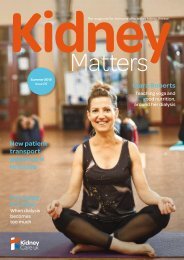Kidney Matters - Issue 14 - 2021
Kidney Matters is our free quarterly magazine for everyone affected by kidney disease. This issue includes features on whole-organ pancreas transplantation, The UK Living Kidney Sharing Scheme, how cycling 30 mins a day during each haemodialysis session can help promote a healthy heart, and an article all about skin cancer after a transplant including diagnosis, treatment and how to lower your risk. As well as this, the Kidney Kitchen features a delicious, healthier twist on homemade fish and chips with mushy peas.
Kidney Matters is our free quarterly magazine for everyone affected by kidney disease.
This issue includes features on whole-organ pancreas transplantation, The UK Living Kidney Sharing Scheme, how cycling 30 mins a day during each haemodialysis session can help promote a healthy heart, and an article all about skin cancer after a transplant including diagnosis, treatment and how to lower your risk.
As well as this, the Kidney Kitchen features a delicious, healthier twist on homemade fish and chips with mushy peas.
Create successful ePaper yourself
Turn your PDF publications into a flip-book with our unique Google optimized e-Paper software.
34
Smiling against the odds
Article by Jayne Pigford
Sometimes the cards stack up against you. You overcome one potentially life-crushing
problem, only to be faced with two more. Jayne Pigford has spent years of her life
battling a formidable series of health issues, including chronic kidney disease. But
she hopes the experiences she shares in her book, ‘Rocking with the Reaper’ will help,
amuse and inspire others to keep on going.
I’ve been a patient for 30 years. I had deep vein
thrombosis (DVT) in my legs at 18 and 21 and a
diagnosis of lupus (systemic lupus erythematosus -
SLE) but carried on studying, then working as a childprotection
social worker, partying and back-packing
for six months. At 31 my ovary started randomly
bleeding and two operations later, I developed
irregular bleeding and clotting and got a new diagnosis
of ‘catastrophic antiphospholipid syndrome’.
Probably because I was so run down by my job, I soon
caught pneumonia and MRSA, had a massive brain
haemorrhage and, finally, complete organ failure. My
family were told I had hours to live.
I left hospital after seven months; a yellow, moonfaced
skeleton with a prognosis that I probably
wouldn’t play tennis again (I’d been really sporty) but
may have a ‘reasonable quality of life’. I was retired
from my career on ill-health grounds, stopped in my
global back-packing tracks and swapped for a healthy
model by my then-partner.
Starting dialysis
I started haemodialysis in 2011 and progressed to
dialysing at home alone. Last January I developed
arterial gangrene in my hand. I had some small cuts
from gardening which couldn’t heal as my massive
fistula was ‘stealing’ too much blood. I now have a
chest line for dialysing.
On paper, my quality of life could be seen as less
than ‘reasonable’, especially given the year’s extra
Covid-isolation. And yet…my life is rich; I love my work
as a psychotherapist and mindfulness teacher, have
brilliant friends and generally feel pretty happy, hence
my writing a book about my experiences and calling it
‘Rocking with the Reaper’. I wanted to encourage and
connect with fellow patients, remind hospital staff
how traumatic being a patient can be, and explain
how reactions like rage are a normal part of trauma
and feeling helpless, show the public how it is to live
with kidney failure and make a friend of Death. My
book also goes off on a tangent or two as I reflect on
human nature and how we’re biologically ‘wired to
connect’ and be kind, as exemplified by our amazing
NHS. I question our current ‘system’ and offer hope
for humanity.
“On paper, my quality of life could
be seen as less than ‘reasonable’,
especially given the year’s extra
Covid-isolation. And yet…my
life is rich; I love my work as a
psychotherapist and mindfulness
teacher, have brilliant friends and
generally feel pretty happy”
Mindfulness and happiness
I show in my book how much mindfulness boosts
my happiness and helps me to manage physical
and emotional pain. Central to mindfulness is the
conscious practice of being grateful. In Kenya, Asia and
Central America, I saw how lucky I am to have running
(heated!) water, a toilet, packed supermarkets, our
amazing NHS and to be living like a queen compared
to most people in the world. I’m also grateful that I can
speak, eat, walk and breathe, having been unable to so
at times. When I remember to look, there’s loads I’m
grateful for, even on a bad day.
My second mindfulness life-saver is ‘living in the
moment’, focusing on my amazing senses. Have
you noticed that it’s hard to feel unhappy as you eat
tasty food, smell fresh-cut grass, listen to the birds,
watch the clouds or feel the sun and breeze on your
face, whilst getting ‘lost in thought’? And can’t our
thoughts make us miserable? I wasted much of my life
worrying about the future or going over the past. But
once I began to stand back and ‘observe’ my thoughts
(regular meditation can really help with this) I was able
to catch myself— “Ah, there I go again, working myself
up with negative thinking”—and return to the beauty of
real life.
Of course, physical and emotional pain is a real part
of kidney failure and mindfulness reminds us that
having self-compassion is central to our well-being. I
was brought up to believe that ‘being soft’ was bad so
I can be self-critical if I’m not a chirpy superwoman.
www.kidneycareuk.org

















